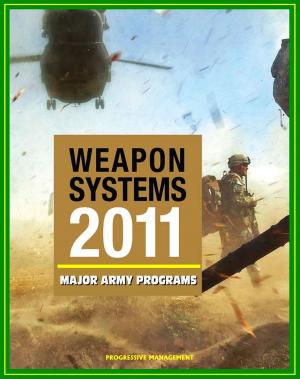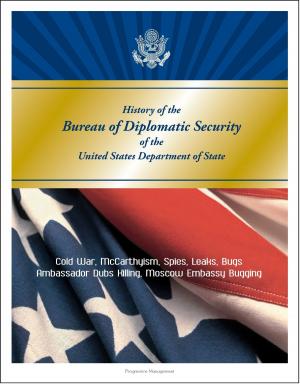Gaming The Interwar: How Naval War College Wargames Tilted the Playing Field for the U.S. Navy During World War II - Molding Mahan, War Plan Orange, Fleet Problems, Feedback, Solomons, Peleliu, Samar
Nonfiction, History, Military, Naval, World War II| Author: | Progressive Management | ISBN: | 9781311737083 |
| Publisher: | Progressive Management | Publication: | May 10, 2016 |
| Imprint: | Smashwords Edition | Language: | English |
| Author: | Progressive Management |
| ISBN: | 9781311737083 |
| Publisher: | Progressive Management |
| Publication: | May 10, 2016 |
| Imprint: | Smashwords Edition |
| Language: | English |
Professionally converted for accurate flowing-text e-book format reproduction, this unique book examines the use of wargaming by the Navy during World War II.
Wargames provide unbelievable opportunities for learning. They pique the interest and passion of the casual tactician or historian and assist the professional military officer in operational planning and execution. Their capacity for imparting knowledge can either supplant or complement lectures. Wargames are a valuable tool for the molding of the professional military officer. During the interwar period the United States Naval War College (NWC) used wargames extensively as a method of teaching both history and current tactics to aspiring naval officers. The NWC believed in wargaming's value so much, an entire building was dedicated to conducting the curriculum's games. On the game floor wars against Great Britain and Japan were repeatedly fought, and the evolution of multiple war plans stemmed from the spirited debates and uncanny tactics the games generated. An entire generation of naval officer brought what they had learned from the NWC's wargames to the fleet.
Wargames directly benefited the U.S. Navy's interwar Fleet Exercises. The exercises were the pinnacle of the fleet's annual training. The lessons learned in Newport were tested in conditions resembling war. Feedback from the exercises both validated and reputed Newport's theories and the war plans' requirements (which the exercises were built to test). World War II was the ultimate test of Newport's lessons. Battles at Savo Island in the Solomon Islands, Peleliu, and Samar in the Philippines pointed out strengths and weaknesses in the NWC's strategic and tactical curricula. Looking into how wargames (simulations) affected war (reality) can provide a model for future training opportunities, particularly in fiscally challenging times; the rising cost of fuel and maintenance of ships underway inspires alternative methods of education and preparation for war.
CHAPTER 1 * INTRODUCTION * CHAPTER 2 * WHY WARGAMING? * Educational Military Gaming * A Brief History * The War College's Interwar Games * CHAPTER 3 * THE EVOLUTION OF THE ENEMY * If Not Red, Then Orange * The Game's Effect On War Plan Orange * Additional Children of the Game * CHAPTER 4 * THE FLEET EXERCISE * The Fleet Problems Test the Navy * Similarities and Differences * What Else Was Learned? * The Feedback Loop * Molding Mahan, In Time For War * CHAPTER 5 * THE GAMES CARRY OVER * The Solomons: Tactical Issues * Peleliu: Too Rigid a Path? * Samar: Spirit of the Underdog * The Aftermath of the Wargames * CHAPTER 6 * CONCLUSION * What Works? * What Doesn't Work? * And So
Professionally converted for accurate flowing-text e-book format reproduction, this unique book examines the use of wargaming by the Navy during World War II.
Wargames provide unbelievable opportunities for learning. They pique the interest and passion of the casual tactician or historian and assist the professional military officer in operational planning and execution. Their capacity for imparting knowledge can either supplant or complement lectures. Wargames are a valuable tool for the molding of the professional military officer. During the interwar period the United States Naval War College (NWC) used wargames extensively as a method of teaching both history and current tactics to aspiring naval officers. The NWC believed in wargaming's value so much, an entire building was dedicated to conducting the curriculum's games. On the game floor wars against Great Britain and Japan were repeatedly fought, and the evolution of multiple war plans stemmed from the spirited debates and uncanny tactics the games generated. An entire generation of naval officer brought what they had learned from the NWC's wargames to the fleet.
Wargames directly benefited the U.S. Navy's interwar Fleet Exercises. The exercises were the pinnacle of the fleet's annual training. The lessons learned in Newport were tested in conditions resembling war. Feedback from the exercises both validated and reputed Newport's theories and the war plans' requirements (which the exercises were built to test). World War II was the ultimate test of Newport's lessons. Battles at Savo Island in the Solomon Islands, Peleliu, and Samar in the Philippines pointed out strengths and weaknesses in the NWC's strategic and tactical curricula. Looking into how wargames (simulations) affected war (reality) can provide a model for future training opportunities, particularly in fiscally challenging times; the rising cost of fuel and maintenance of ships underway inspires alternative methods of education and preparation for war.
CHAPTER 1 * INTRODUCTION * CHAPTER 2 * WHY WARGAMING? * Educational Military Gaming * A Brief History * The War College's Interwar Games * CHAPTER 3 * THE EVOLUTION OF THE ENEMY * If Not Red, Then Orange * The Game's Effect On War Plan Orange * Additional Children of the Game * CHAPTER 4 * THE FLEET EXERCISE * The Fleet Problems Test the Navy * Similarities and Differences * What Else Was Learned? * The Feedback Loop * Molding Mahan, In Time For War * CHAPTER 5 * THE GAMES CARRY OVER * The Solomons: Tactical Issues * Peleliu: Too Rigid a Path? * Samar: Spirit of the Underdog * The Aftermath of the Wargames * CHAPTER 6 * CONCLUSION * What Works? * What Doesn't Work? * And So















